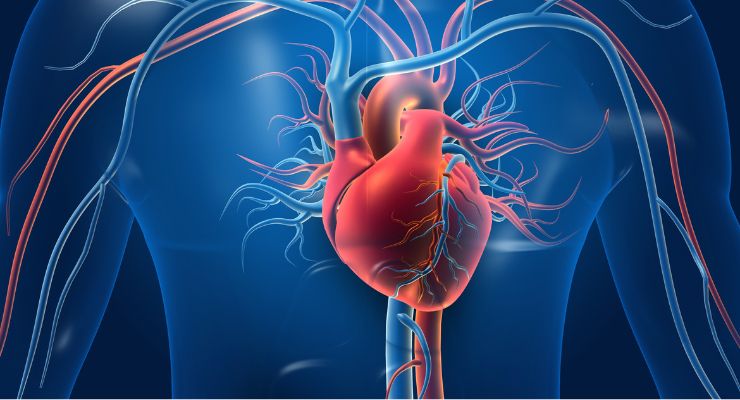02.01.24
Supplementing with a combination of vitamin D and vitamin K2 may have a beneficial effect on coronary artery calcification (CAC) progression, according to a new study published in the Journal of the American College of Cardiology.
The study used Balchem’s K2Vital Delta, which typically contains 99.7% all-trans vitamin K2 in the form of menaquinone-7 (MK-7).
Coronary artery calcification is highly prevalent in patients with coronary heart disease. It is defined as the buildup of calcium in the plaque of coronary arteries, and higher CAC scores are associated with a relatively high risk of heart attack or other heart disease.
The present study, known as the Aortic Valve Decalcification Trial (AVADEC), investigated the role that vitamin K2 and D supplementation might have in CAC progression, in a population of 304 men with higher CAC scores, who didn’t have previous heart valve surgery, moderate aortic stenosis, treatment with vitamin K agonists, or disorders involving calcium/phosphate metabolism or coagulation. The study also excluded participants with previous myocardial infarction, percutaneous coronary intervention, or coronary artery bypass graft surgery.
No significant effect was observed on CAC score in the total group. However, two-years of treatment with vitamin D and K2 in a subgroup analysis of high-risk patients (with CAC scores of over 400) with no prior ischemic heart disease saw a significant slowdown in CAC progression.
Statin users also displayed a significant slowdown in the progression of CAC score following vitamin K2 and D intervention.
Further, the number of adverse events in patients, which include acute myocardial infarction, coronary revascularization, and all-cause death, was lower in the treatment group compared to placebo.
“Scientific observations reveal that vitamin K2 and D supplementation play an important role in heart health, but there is limited research that delves deeper into the mechanism of action behind this benefit. Our research set out to fill this gap in knowledge, with discoveries from the subgroup analyses offering promising insights into the role of both vitamins in calcification in specific populations,” said Axel Diederichsen, lead author of the study and professor at Odense University Hospital in Denmark.
Vitamin K2 as MK-7 is also being investigated in overall arterial health. A 2023 study demonstrated that 24 weeks of daily supplementation with 375 mcg of vitamin K2 lowered the rate of arterial stiffness progression in chronic hemodialysis patients with diabetes.
Further, another study from last year found that 360 mcg of vitamin K2 daily in kidney transplant recipients significantly improved arterial elasticity after 12 weeks.
“As an industry leader in vitamin K2 MK-7 scientific excellence, we remain at the forefront of cutting-edge research in the field, and we are excited to have uncovered findings that are important for the future of our understanding of the heart health space,” said Trygve Bergeland, director of nutrition science at Kappa Bioscience, which was recently acquired by Balchem. “These latest discoveries in CAC progression and arterial stiffness signify a step forward for heart health solutions and will most certainly open up new development opportunities.”
The study used Balchem’s K2Vital Delta, which typically contains 99.7% all-trans vitamin K2 in the form of menaquinone-7 (MK-7).
Coronary artery calcification is highly prevalent in patients with coronary heart disease. It is defined as the buildup of calcium in the plaque of coronary arteries, and higher CAC scores are associated with a relatively high risk of heart attack or other heart disease.
The present study, known as the Aortic Valve Decalcification Trial (AVADEC), investigated the role that vitamin K2 and D supplementation might have in CAC progression, in a population of 304 men with higher CAC scores, who didn’t have previous heart valve surgery, moderate aortic stenosis, treatment with vitamin K agonists, or disorders involving calcium/phosphate metabolism or coagulation. The study also excluded participants with previous myocardial infarction, percutaneous coronary intervention, or coronary artery bypass graft surgery.
No significant effect was observed on CAC score in the total group. However, two-years of treatment with vitamin D and K2 in a subgroup analysis of high-risk patients (with CAC scores of over 400) with no prior ischemic heart disease saw a significant slowdown in CAC progression.
Statin users also displayed a significant slowdown in the progression of CAC score following vitamin K2 and D intervention.
Further, the number of adverse events in patients, which include acute myocardial infarction, coronary revascularization, and all-cause death, was lower in the treatment group compared to placebo.
“Scientific observations reveal that vitamin K2 and D supplementation play an important role in heart health, but there is limited research that delves deeper into the mechanism of action behind this benefit. Our research set out to fill this gap in knowledge, with discoveries from the subgroup analyses offering promising insights into the role of both vitamins in calcification in specific populations,” said Axel Diederichsen, lead author of the study and professor at Odense University Hospital in Denmark.
Vitamin K2 as MK-7 is also being investigated in overall arterial health. A 2023 study demonstrated that 24 weeks of daily supplementation with 375 mcg of vitamin K2 lowered the rate of arterial stiffness progression in chronic hemodialysis patients with diabetes.
Further, another study from last year found that 360 mcg of vitamin K2 daily in kidney transplant recipients significantly improved arterial elasticity after 12 weeks.
“As an industry leader in vitamin K2 MK-7 scientific excellence, we remain at the forefront of cutting-edge research in the field, and we are excited to have uncovered findings that are important for the future of our understanding of the heart health space,” said Trygve Bergeland, director of nutrition science at Kappa Bioscience, which was recently acquired by Balchem. “These latest discoveries in CAC progression and arterial stiffness signify a step forward for heart health solutions and will most certainly open up new development opportunities.”




























